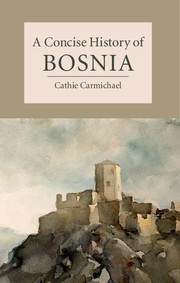Book contents
- Frontmatter
- Contents
- List of figures
- List of maps
- Acknowledgements
- Preface
- Chronology of events in Bosnian history
- 1 Introduction
- 2 Bosnia, Hercegovina and the Ottoman Empire (1463–1912)
- 3 Rebellion, war and the Habsburgs (1875–1918)
- 4 Royalist Yugoslavia, the Independent State of Croatia and the Second World War (1918–1945)
- 5 Bosnia and the Communist experiment
- 6 Bosnian independence, war and genocide
- 7 Conclusion: ‘unmixing’ Bosnia and Hercegovina
- Bibliography
- Index
5 - Bosnia and the Communist experiment
Published online by Cambridge University Press: 05 July 2015
- Frontmatter
- Contents
- List of figures
- List of maps
- Acknowledgements
- Preface
- Chronology of events in Bosnian history
- 1 Introduction
- 2 Bosnia, Hercegovina and the Ottoman Empire (1463–1912)
- 3 Rebellion, war and the Habsburgs (1875–1918)
- 4 Royalist Yugoslavia, the Independent State of Croatia and the Second World War (1918–1945)
- 5 Bosnia and the Communist experiment
- 6 Bosnian independence, war and genocide
- 7 Conclusion: ‘unmixing’ Bosnia and Hercegovina
- Bibliography
- Index
Summary
ECONOMY AND SOCIETY
At the end of the war, Tito and his comrades at the top of the party took the historic decision, codified in the 1946 Constitution, to create a Bosnian republic drawing on an earlier move by the Partisans in 1943. Paradoxically, a system that was designed to contain nationalism actually ossified pre-existing categories. The Communist Partisans, like other Marxists, were highly influenced by Stalin's work on the national question and the Yugoslavia that they constructed as a federation of republics in 1946 was modelled closely on the Soviet Union. The future status of Bosnia-Hercegovina was debated until the Communists rejected the idea of it as an autonomous region and decided instead that it should be a separate republic with three constituent nationalities, all of whom were equal. Although the new Yugoslavian state was ‘largely manned by the Serbs of Bosnia and Croatia’, as Stevan K. Pavlowitch has argued, the new Republican divisions were specifically designed to keep Serbia smaller and weaker in a confederation in which they represented 42 per cent of the overall population. Perhaps as significantly, the Communists created Slovenian and Macedonian republics for the first time and restored the old polity of Montenegro, which had in effect disappeared in 1918. The first prime minister of the new Bosnian Republic was Rodoljub Čolaković, a long-term Communist who had been involved in Crvena Pravda in the 1920s. Originally from Bijeljina, in 1937 he had travelled to Spain to fight for the Republicans. Between 1946 and 1955 he published five volumes of an influential ‘memoir of the liberation war’, Zapisi iz oslobodilačkog rata. He had honed his writing skills in the Comintern before the war and writing for Borba. Čolaković remained prime minister of the republic until 1948, when he was replaced by another prominent Partisan Djuro Pucar, nicknamed ‘Stari’ (‘the old guy’) even though he was only in his early forties during the war.
- Type
- Chapter
- Information
- A Concise History of Bosnia , pp. 95 - 134Publisher: Cambridge University PressPrint publication year: 2015



